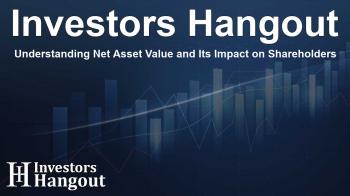Understanding Net Asset Value and Its Impact on Shareholders

Introduction to Net Asset Value
Understanding the Net Asset Value (NAV) is crucial for investors in any company, including Octopus Future Generations VCT plc. The NAV essentially reflects the value of a company's assets minus its liabilities, providing a snapshot of the financial health and potential growth opportunities of the investment.
Recent NAV Updates
As of the midpoint of the fiscal year, the Board of Octopus Future Generations VCT plc announced its unaudited Net Asset Value as being 88.4 pence per share. This value provides a valuable point of reference for current and prospective shareholders looking to assess their investment's performance.
What Does the NAV Include?
The announced NAV includes a special dividend of 5.6 pence per share. This dividend is a significant part of the total NAV and highlights the company's commitment to returning value to its shareholders. The dividend is set to be payable on a future date to shareholders recorded on a specific register date, ensuring timely distributions to those invested in the company.
Importance of Dividends in NAV Calculation
When evaluating the Net Asset Value, understanding the components such as dividends is critical. Dividends not only provide immediate financial returns to shareholders but can also indicate a company's overall stability and growth strategy. For instance, the upcoming dividend payment illustrates Octopus Future Generations' proactive approach in allocating resources for shareholder benefit.
Shareholders and Their Opportunities
For shareholders, the positive NAV indicates that the company is not only managing its assets effectively but also rewarding its shareholders with dividends. This aligned interest can foster confidence in the company's management and lead investors to make informed decisions regarding their shares.
Conclusion: Looking Ahead
The announcement surrounding the Net Asset Value from Octopus Future Generations VCT plc represents a crucial opportunity for both current and future shareholders to understand the value locked within the shares. Monitoring the NAV and understanding its implications, especially with upcoming dividends, can greatly enhance investment strategies.
Frequently Asked Questions
What is Net Asset Value (NAV)?
NAV is a financial metric that represents the company's total assets minus its total liabilities, giving shareholders insight into its value.
How often is NAV reported?
Typically, NAV is reported quarterly or biannually, depending on the company's reporting schedule.
Why is a special dividend significant?
A special dividend indicates that a company is sharing additional profits with its shareholders, reflecting strong financial performance.
What should shareholders do with NAV information?
Shareholders use NAV to gauge their investment's worth and assess whether to hold, sell, or buy more shares.
How is the upcoming dividend related to NAV?
The upcoming dividend is factored into the NAV, impacting the overall valuation of the shares for potential and existing investors.
About The Author
Contact Owen Jenkins privately here. Or send an email with ATTN: Owen Jenkins as the subject to contact@investorshangout.com.
About Investors Hangout
Investors Hangout is a leading online stock forum for financial discussion and learning, offering a wide range of free tools and resources. It draws in traders of all levels, who exchange market knowledge, investigate trading tactics, and keep an eye on industry developments in real time. Featuring financial articles, stock message boards, quotes, charts, company profiles, and live news updates. Through cooperative learning and a wealth of informational resources, it helps users from novices creating their first portfolios to experts honing their techniques. Join Investors Hangout today: https://investorshangout.com/
The content of this article is based on factual, publicly available information and does not represent legal, financial, or investment advice. Investors Hangout does not offer financial advice, and the author is not a licensed financial advisor. Consult a qualified advisor before making any financial or investment decisions based on this article. This article should not be considered advice to purchase, sell, or hold any securities or other investments. If any of the material provided here is inaccurate, please contact us for corrections.

